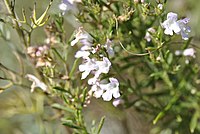
Photo from wikipedia
A large subset of plant stress-signaling pathways, including those related with chemical defense production, exhibit diurnal or circadian oscillations. However the extent to which diurnal or circadian time influences the… Click to show full abstract
A large subset of plant stress-signaling pathways, including those related with chemical defense production, exhibit diurnal or circadian oscillations. However the extent to which diurnal or circadian time influences the stress mediated accumulation of plant specialized metabolites remains largely unknown. Because plant responses to physical stress (e.g., wounding) is considered a common component of mounting a response against a broad range of environmental stresses, including herbivory, we have utilized mechanical wounding as the stress stimulus to determine the direct contribution of time of day on the induced defenses of Brassica crops. We analyzed glucosinolates (GSLs) from leaves of broccoli (Brassica oleracea) and turnip greens (Brassica rapa) following exposure to mechanical wounding at dawn (ZT0), mid-day (ZT4), and dusk (ZT8). Several GSLs differentially accumulated and their changes depended upon the time of day at wounding was performed. This response varied considerably between species. In a parallel experiment, we investigated whether diurnal activation of Brassica phytochemicals in response to wounding might prime plants against herbivore attack. Results showed that maximal response of plant chemical defense against larvae of the generalist pest Mamestra brassicae occurred at ZT0 in broccoli and ZT8 in turnip greens. Metabolome analysis for global trends of time dependent compounds showed that sulfur-containing phytochemicals, GSL hydrolysis products, auxin-signaling components, and other metabolites activators of plant disease resistance (nicotinamide and pipecolate) had important contributions to the responses of M. brassicae feeding behavior in broccoli at morning. Overall, the findings in this study highlight a significant role for time of day in the wound stress responsive metabolome, which can in turn affect plant-herbivore interactions.
Journal Title: Frontiers in Plant Science
Year Published: 2022
Link to full text (if available)
Share on Social Media: Sign Up to like & get
recommendations!